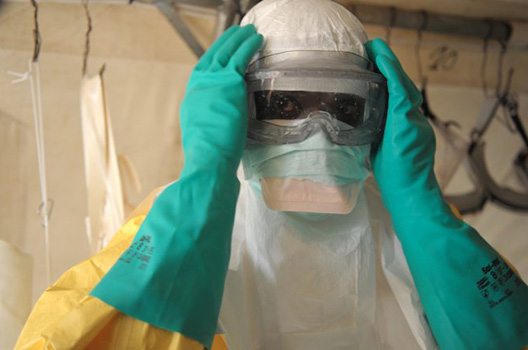
The deaths of more than 3,000 people from the Ebola virus have stunned and, indeed, frightened the world. The outbreak now hits home — ever since the Centers for Disease Control and Prevention reported the first case in which Ebola has been diagnosed outside Africa, in a man from Liberia who took a commercial flight that landed in Texas a little more than one week ago.
The epidemic—which has disproportionately affected the West African states of Guinea, Liberia, and Sierra Leone—has been the largest and deadliest outbreak to date. Currently, the Centers for Disease Control and Prevention estimates that, if unabated, potentially nearly 1.5 million people could be infected with this disease by January.
We are responding to the human toll right now, as we absolutely must.
President Barack Obama has declared that containing the epidemic is a top national security issue and announced a significant boost to US humanitarian assistance as well as the deployment of 3,000 troops to support and strengthen the relief work already underway. As we mobilize an international response and resources, we are literally fighting against time itself because the number of cases is doubling about every three weeks.
But, beyond the immediate tragedy, there are significant short, medium, and long-term impacts that we are not even beginning to address.
First, the hardest hit countries—Guinea, Liberia, and Sierra Leone—are already at the near bottom of the United Nations Development Program’s Human Development Index. Furthermore, Liberia and Sierra Leone were just beginning to recover from decade-long civil wars that tore them apart, devastated their economies and basic infrastructure, and during which they suffered major population losses. Just as they were clawing their way back, these countries got hit with this health crisis.
Secondly, the estimated economic growth for these countries will be cut dramatically, according to the World Bank. Sierra Leone was expected to grow by more than 11 percent in 2014, but that’s now revised down to roughly 8 percent. Liberia’s growth was estimated to reach 6 percent, but it’s expected to be half of that now. Guinea’s economy was expected grow around 4.5 percent, and it’s been revised to 2.4 percent. The reduced economic growth—from what was already at a low base—will have significant impacts on the lives of ordinary people, who are suffering from this health crisis.
For the governments of these three countries, this is a major blow, as they are expected to lose more than a quarter billion dollars in revenue they would otherwise collect. That shortfall will have to be met somehow or else the already precarious social, educational, and other governmental service systems in the three hard-hit countries are going to collapse even further.
In the medium term, companies are pulling out. Liberia’s two biggest investors in the mining sector have essentially ceased production, largely because expatriate workers have been pulled out of the country. That will have major implications in terms of lowering economic growth and job opportunities.
Thirdly, over the long term, the stress placed on already weak health, commercial, and other social infrastructures has weakened the social fabrics of these countries—and these are necessary for functioning economies and governments. In addition to dealing with the humanitarian and health issues, these countries—which are just emerging from civil strife, the wounds of which have not been fully reconciled—will need to heal their communities anew and rebuild basic trust between peoples and communities. That represents the greatest long-term challenge we have yet to fully grasp.
J. Peter Pham is director of the Atlantic Council’s Africa Center.
